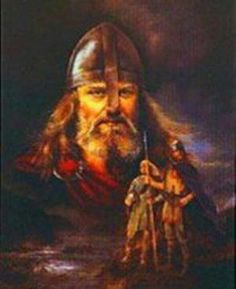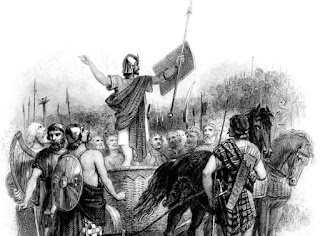Who were the Celts?
The popular notion persists that at some date around 700 BC, Scotland was conquered by the Celts. These woad-painted, sword- wielding warriors from central Europe had already overrun most of the Continent; now they arrived at these shores, subdued the natives and made this land their own. By such means did Scotland become part of a European-wide Celtic society stretching from Ireland to eastern Europe, a culture that would in time defiantly resist the armed might of Imperial Rome. The truth is very probably something quite different.
The idea that our history evolved only through a cycle of invasions, colonisations and displacements is relatively recent. It originated in the nineteenth century through archaeologists attempting to explain how certain material objects or physical structures sharing close characteristics came to be found dispersed over huge distances. Hence the invention of the 'Beaker folk', who at the start of the 'Bronze Age' created a form of pottery that is found widely across Europe.
The creation of the 'Celts' as an all-conquering race followed the same logic. It was based largely on the discovery of decorative metalwork from a lake near La Tène in Switzerland, of a type also to be found across great swathes of Europe. Archaeologists put 2 + 2 together and came up with 5. They presumed that language and material culture (art. architecture and so forth) could be spread only through conquest.
That there was a tribe called the Celts is undeniable. The Greeks referred to the 'Keltoi' in the sixth century BC, and subsequent Roman authors wrote of the 'Celtae'. By Julius Caesar's time in the first century BC, these Celts were clearly inhabiting southern and central France. Nowhere is there any hard evidence that these same Celts had invaded and conquered Scotland several centuries earlier.
What there is evidence for, though, is of several closely related languages linking the peoples of a substantial part of northern and western Europe - and these tongues, which included Scots Gaelic, Pictish, Cumbric and Brittonic, have been labelled 'Celtic'. The error archaeologists made in the nineteenth century was to equate this linguistic spread with the material evidence. So how could language spread if not through conquest?
The answer is that it could just as easily have been spread through the processes of exchange and trade. As far back as Stone Age times, highly prized commodities like stone axes were traded over immense distances.
During the Bronze Age the rare metals of gold and tin were similarly 'exported'. In order for goods to be traded, merchants would have needed to converse. Even if their respective languages were quite different and mutually unintelligible, some form of common language would have been required. This was after all how Swahili developed in more recent times, a fundamentally Bantu tongue modified by Arabic through the extensive East African trade and now spoken by 30 million people worldwide.
That said, there might conceivably have been some small-scale conquests, or movements of tribes, from the Continent of Europe into Scotland during the pre-Roman era. Caesar himself wrote of the Belgae, whose southern boundary marched with that of the Celtae, having crossed to southern England some time before 100 BC, and it may be that similar encroachments were made along Scotland's eastern coast. It is also conceivable that the arrival of the Belgae put pressure on the indigenous population and forced them north in search of pastures new. Famine and disease may also have prompted such wholesale movements of people.
Notwithstanding the passage of time, there is still a unique bond uniting the 'Celtic' peoples, chiefly those of Scotland, Man, Ireland, Wales, Cornwall and Brittany. There is no doubting the common culture, of language and music, that identifies us, that marks us out as being from a common root. But it is most unlikely that our Scottish link with the Celtic tradition all came about with a single conquest, as attractive and as fascinating as that idea sounds.












Comments
Post a Comment